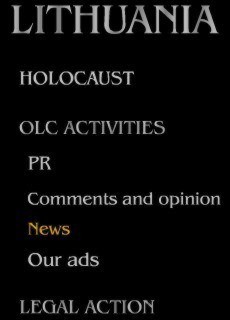|
Editor’s note: The following is an English translation by Geoff Vasil of an article that appeared on Delfi.lt on October 25, 2013. The images that appeared with the original Lithuanian text are not reproduced here.
In 1999, The Association of Lithuanian Jews in Israel published Crime and Punishment, compiled after many years of work, by its chairman, Tel Aviv attorney Joseph Melamed, a native of Kovno (Kaunas), Holocaust survivor and veteran of the Jewish partisan resistance in Lithuania and of the Israeli War of Independence. In the late 1990s, Mr. Melamed wrote repeatedly to Lithuanian prosecutors, explaining that some Holocaust perpetrators and witnesses were still alive and investigations could be pursued.
He never received a reply. A dozen years later, in 2011, Lithuanian prosecutors sent Interpol (!) to disturb him in Tel Aviv with accusations that his book had slandered “heroes” of the anti-Soviet resistance. This was after a media fracas broke out in Vilnius in 2009 when someone first noticed that the list had also appeared on the website of the Association of Lithuanian Jews in Israel. At the time, the director of the Vilnius Yiddish (!) Institute told the Baltic Times that the Holocaust survivors in Israel who published the list “are extreme right-wingers and scholars don’t talk to them” (he has since been promoted to the “red-brown commission”). At the time, the Jewish community’s newspaper, Jerusalem of Lithuania, published a detailed response by its editor, Milan Chersonski.
The Genocide Center in Vilnius is generally considered to be biased in the cause of Baltic ultranationalism. Various of the institutions it has supplied with “historic captions,” including the Genocide Museum in Vilnius and Gruto Parkas (“the Lenin statue park”) in the southeast of the country, feature overt antisemitic texts. For years, a leading official at the center “moonlighted” as the organizer of annual neo-Nazi marches in the center of the nation’s capital, Vilnius.
The 2011 accusations against Mr. Melamed attracted comment in the British Parliament and coverage in Haaretz, the Jewish Telegraphic Agency (JTA), and other media outlets.
It will now be up to specialists to consider the Genocide Center’s newest pronouncement on the local murderers of the Jewish minority in Lithuania, especially the claim that they were “forced to do it” when the historical record provides a very different picture. There is also the question of whether consistent academic standards were applied to those suspects who are or are not “wanted as national heroes” in light of postwar activities. It is clear that each individual case deserves its own evaluation dependent on the evidence. A major problem for decades has been the lack of political will to interview witnesses while they were still alive in a macabre stalling game described on multiple occasions by the Simon Wiesenthal Center’s Israel office.
For information on individual “national heroes” implicated in Holocaust atrocities, see the Evaldas Balčiūnas, Milan Chersonski and Collaborators Glorified sections; the page on memorials in public spaces for collaborators and perpetrators; and Milan Chersonski’s 2009 response to events unfolding in the ongoing saga.
But when all is said and done, as the era of “talk of prosecutions” shifts into history, two issues will remain paramount:
(1) the activities of each suspect, particularly during 1941, will have to come under impartial investigation. A state-funded “Genocide Center” that provides antisemitic texts to museums and memorials, and has employed in high capacity an organizer of neo-Nazi marches and regularly glorifies Lithuanian Activist Front and other killers, has no moral authority to pretend to be providing the answers.
(2) There is a moral battle of ideas underway concerning the question of whether any of Nazi Germany’s allies, activists, enablers and assistants in Eastern Europe (particularly, where this aid was inextricably linked to the program of immediate genocide) ought to be hailed as “heroes” in countries subscribing to the most fundamental moral fabric of NATO and the European Union.
defendinghistory.com
|


